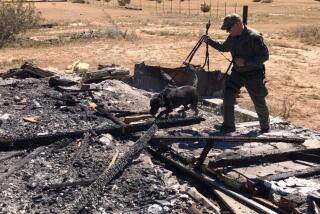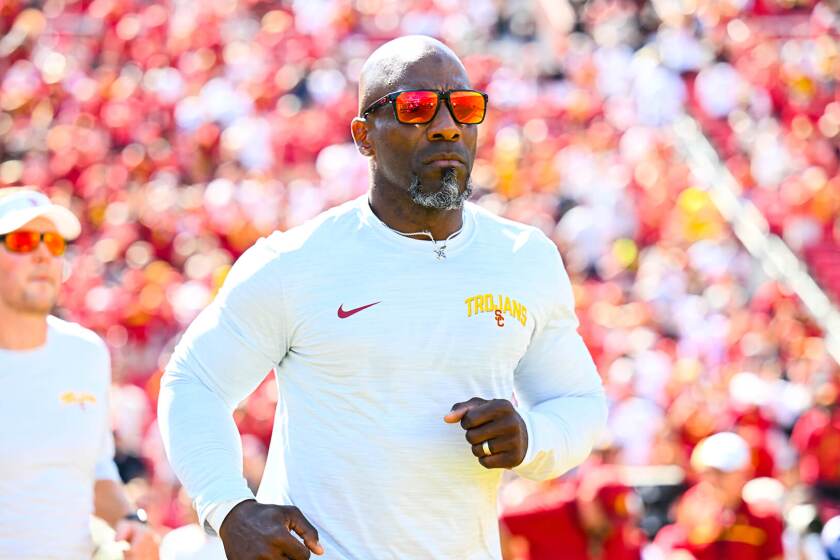McNair says his case differed from Vick’s
- Share via
USC assistant football coach Todd McNair said Wednesday that reports detailing his two 1990s convictions for mistreating dogs did not “accurately portray” what actually happened.
“I understand the interest about the thing in light of all that’s gone on in Virginia with the [Michael] Vick case and everything,” he said in an interview outside USC’s Heritage Hall. “But my case was totally different from that. . . . I was cited for neglect. I wasn’t convicted for abuse.”
McNair, who is about to begin his fourth season as the Trojans’ running backs coach, was charged with cruelty to animals, failure to obtain licenses and keeping animals for the purpose of fighting in March 1996 after authorities found more than 20 pit pulls on property he owned in East Greenwich, N.J.
He was also charged with animal neglect in July 1993.
McNair, 42, said both cases stemmed from his failed attempts at dog breeding.
“I had a number of different breeds at different points of time over a couple years,” he said. “I realized I got in over my head. I wasn’t able to maintain it properly and it cost me.”
Law enforcement authorities who investigated the 1996 case paint a different picture. They say “all indications” showed the former NFL running back was involved in pit bull fighting.
“We didn’t witness a dogfight taking place, but . . . that’s what the dogs were used for,” said East Greenwich Township Police Det.-Sgt. Charles Barone. “There was a treadmill used for [dog] training, and we found the dogs in an unsheltered, wooded area far from the highway, where they were held down by [automobile towing] chains connected to large tire rims. It was deplorable.”
Gloucester County Judge J.R. Powell said in court that insufficient evidence kept him from convicting McNair of dogfighting. However, prosecutors won misdemeanor convictions against McNair on 17 counts of animal cruelty and failure to license dogs.
McNair was fined more than $4,900 and ordered to fulfill community service obligations, according to a local newspaper report. Court authorities said Wednesday that the official municipal court decision of the case has probably been destroyed.
McNair, a former Kansas City Chiefs and Houston Oilers running back, said he did not tell USC officials about his convictions when he was hired onto the football staff in 2004 because he “had no reason to think it would ever come up. I didn’t look at it as I did a crime and was convicted anyway. I was exonerated from all the stuff.”
However, he said he did tell USC Coach Pete Carroll about the incidents about a week ago when the Vick case was making national headlines. Vick, star quarterback of the Atlanta Falcons, recently pleaded guilty to a federal conspiracy charge related to dogfighting and is facing a probable prison sentence.
“We had some kind of idea that with all that’s going on . . . it’s a possibility it could come up and somebody could ask me questions about it,” McNair said.
Carroll said he still would have hired McNair even if he had known about his convictions. “I wouldn’t have recognized it as an issue,” he said.
Lt. Col. Sy Goldberg of the New Jersey Society for the Prevention of Cruelty to Animals’ Humane Police said until Vick’s role in dogfighting ring brought national attention, the “blood sport” wasn’t treated or prosecuted as seriously as it should.
Goldberg inspected McNair’s property in 1996 and told police, “It was obvious the area was being used to train dogs for fighting.” Reached Wednesday, Goldberg called the extent of the injured dogs at McNair’s property “outrageous.”
Det.-Sgt. Barone said he brought the McNair case to the attention of federal law enforcement investigators, but they dismissed it.
“Dogfighting wasn’t a big deal back then like it is now, but what I saw [at McNair’s property] was the same activity that Michael Vick was in,” Goldberg said. “Animal cruelty was an easier charge to prove, but if you look at the pictures from the case the dog’s face was absolutely mauled.”
On Wednesday, police e-mailed to The Times several crime scene photos, including shots of one dog’s mangled face and another reacting viciously as police arrived on the scene.
Court records show that the case originated when a pit bull named Shadow, scarred on the face and head, escaped from McNair’s property by jumping through a broken window.
While investigating Shadow’s escape, Barone heard “dogs in distress, barking, crying and howling,” and later found one named Crutch with a broken leg. Others were “extremely agitated, vicious and aggressive,” according to court records.
Barone wrote, “All of the dogs appeared to have scars, marks and cuts on their heads and bodies . . . several . . . have open wounds.” Other dogs were suffering from “poor diet, sores,” or were “full of worms.”
Most of the dogs seized from McNair were euthanized, police said. McNair said he had bred the dogs for sale.
“I love dogs,” he added. “I’ve had dogs my whole life. I got one now, a pug named Pork Chop.”
Two years earlier, at another property McNair owned in Paulsboro, N.J., police said they shot and killed a pit bull they suspected belonged to McNair.
McNair was also charged with animal neglect in 1993 in Missouri. He was convicted then for failing to display tags on his dogs Bismark and Popeye, and received a sentence of probation and a fine. A Blue Springs, Mo. detective told New Jersey authorities that McNair exposed the “shuddering and soaking wet” dogs to inclement weather.
“It was a lesson,” McNair said Wednesday of the experience, “and once everything happened back then, I did what I was supposed to do. I handled what I was supposed to handle and I got rid of it.”
Carroll said McNair was “not the kind of person who’s going to abuse anything.”
“Everybody makes errors in judgment and makes mistakes,” the head coach said. “Hopefully, you rectify and you learn and you grow and you go ahead, and I know that’s what he’s done.
“I know the guy, and I know exactly what he’s done. I feel very sorry for anybody who is mistreated and not dealt with properly and hopefully we can always learn and grow and make sure that we do the right thing to take care of people and animals as well.”
After his 1996 conviction, McNair, then playing for the Chiefs, was greeted by protests by animal activists when his team played at Mile High Stadium in Denver.
Dan Shannon, assistant director of People for the Ethical Treatment of Animals (PETA), said his organization wasn’t planning to protest at USC because of McNair’s dated crimes. However, he said the cases reinforce why the NFL should add animal cruelty to its list of violations of the league’s personal conduct policy.
“We wrote to the NFL about this when it happened, and they said it was best handled by local law enforcement,” Shannon said. “If you saw the Todd McNair case happen now, he would have been met by a stronger response.”
In light of recent animal neglect or abuse cases surrounding NFL players Jonathan Babineaux and Tank Johnson and former NBA player Qyntel Woods, Shannon says he’s “hoping people in law enforcement will tolerate this less and less, so they’ll actually prosecute dogfighting instead of saying it’s too tedious to prove.
“What happened here was some awful stuff.”
--
gary.klein@latimes.com
More to Read
Go beyond the scoreboard
Get the latest on L.A.'s teams in the daily Sports Report newsletter.
You may occasionally receive promotional content from the Los Angeles Times.








